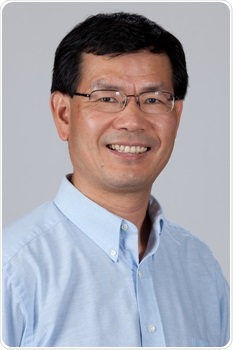Aug 11 2015
In a discovery with implications for future drug design, scientists from the Florida campus of The Scripps Research Institute (TSRI) have shown an unprecedented mechanism for how a natural antibiotic with antitumor properties incorporates sulfur into its molecular structure, an essential ingredient of its antitumor activity.

Ben Shen is a professor at the Florida campus of The Scripps Research Institute.
This new discovery could open the way to incorporating sulfur into other natural products, potentially advancing new therapies for indications beyond cancer.
The study, which was led by TSRI Professor Ben Shen, was recently released online ahead of print by the journal Proceedings of the National Academy of Sciences, USA.
"We found a novel mechanism to incorporate sulfur into natural products, which is unprecedented," Shen said. "Until our study, we didn't really know how sulfur atoms are incorporated into a natural product--now we have discovered a new family of enzymes and have a workable mechanism to account for sulfur incorporation into a larger class of natural products, known as polyketides, that include many drugs such as erythromycin (antibacterial) and lovastatin (cholesterol lowering)."
Sulfur is critical not only to human life, but to plants and bacteria as well, and is one of the most abundant elements in the human body by weight. A number of compounds that contain sulfur have proven useful in the treatment of conditions ranging from acne and eczema to arthritis and cancer.
The new study is focused on leinamycin (LNM), a sulfur-containing antitumor antibiotic produced by species of the soil-dwelling bacterium Streptomyces. The Shen laboratory has been studying the potential of this natural compound for development of anticancer drugs. They recently reported the discovery of LNM E1, an engineered analogue of LNM, as a "prodrug," a medication converted through a metabolic process in the body to become an active therapy (see "Scripps Florida Scientists Show Antitumor Agent Can Be Activated by Natural Response to Cell Stress").
"With LNM, sulfur plays the critical role in its anticancer activity," Shen said. "With many other natural products, sulfur could add other therapeutic properties. This is the beauty of fundamental research--it lays the foundation to create novel technologies that enable innovative translational research with implications far beyond the original discovery."
The study links a family of enzymes--molecules that act as biological catalysts--known as polyketide synthases (PKS) directly to a complex series of chemical reactions that ultimately add sulfur to leinamycin, a member of the polyketide family of natural products.
"The sulfur incorporation mechanism discovered in our study revealed the novel function of a polyketide synthase, greatly expanding our understanding of its chemistry," said Ming Ma, one of the co-first authors of the study and a member of the Shen lab. "Since polyketide synthases are a large family of enzymes that have been proven amenable for polyketide structural diversity and drug discovery, it is particularly exciting that this new discovery now provides the possibilities of adding sulfur atoms to compounds similar to leinamycin or other polyketide natural products."
Because few sulfur-containing natural products are known, this particular enzyme and its gene could now be useful tools to probe ecological niches for the discovery of other sulfur-containing natural products.